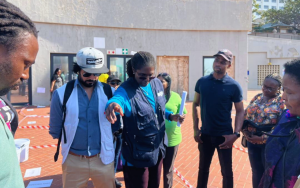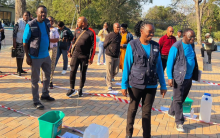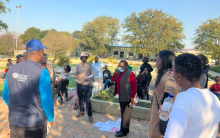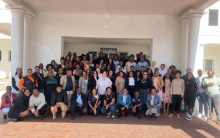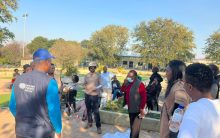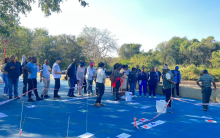Strengthening Cholera Preparedness/Readiness and Response in South Africa through Training
August 1, 2023- The recent outbreak of Cholera in South Africa was met with a strong response from Government and its partners to bring the situation under control. With the outbreak contained, it becomes necessary for the country to strengthen capacity and seek ways to containing and reducing impact of outbreaks.
The National Department of Health with technical support from the World Health Organization (WHO), working in collaboration with Médecins Sans Frontières (MSF) and the United Nations Children's Fund (UNICEF), has taken proactive steps to strengthen preparedness in the event of future outbreaks. Together, they have organized a comprehensive Cholera preparedness/readiness and response training, which is being conducted for all the nine Provinces in the country; Western Cape, Free State, Mpumalanga, Northern Cape, Limpopo, North-West, KwaZulu Natal (KZN), Gauteng, and Eastern Cape.
The 4-day intensive training aims to enhance the capacity of participants at the national and sub-national levels to effectively prepare for and respond to cholera outbreaks. The training covers three key focus areas to tackle the issue at various levels.
The first focus area is improving prevention, preparedness and timely response. Participants are equipped with knowledge about the epidemiology and transmission of cholera, as well as best practices for prevention. The training also emphasizes early detection and rapid response to potential outbreaks, which will significantly minimize the disease's impact on vulnerable communities.
Strengthening planning and implementation is the second focus area of the training. Proper planning and execution are crucial during crisis situations. Participants engage in simulations that foster teamwork, communication, and coordination among different stakeholders. This collaborative effort ensures a more efficient and synchronized response when dealing with cholera outbreaks.
The third focus area is capacity building for Provincial and District levels. Recognizing the importance of widespread preparedness, the training aims to empower participants at the provincial and district levels. Each attendee gains the necessary knowledge and skills to contribute effectively to their respective areas of work, creating a robust network of expertise across the country.
The training adopts an interactive and dynamic approach, combining presentations with hands-on exercises and real-life case studies from past cholera outbreaks. Leading experts share their experiences, providing invaluable insights into successful strategies and lessons learned.
So far, the trainings have been held in Tzaneen, Durban, and Richards Bay, covering three provinces with over 360 participants trained.
Speaking on the training, one of the participants, Nkosingiphile Nzuza, stated the importance of staying vigilant and ready to detect and mitigate any threats to public health. “The training not only helps prevent the spread of cholera but also encourages collaboration with neighboring countries to share best practices.”
Dr. Ben Kyoza from Limpopo emphasized “the need for a multisectoral approach to stay on top of cholera outbreaks and strengthen resilience and response.” Effective coordination and continued advocacy are critical to reducing the threat of cholera.
The training wraps up in KwaZulu Natal and the train moves next to Mpumalanga.
With these trainings, the country remains committed to strengthening capacity and seeking ways to contain and reduce the impact of future outbreaks. Environmental surveillance will continue to play a crucial role in monitoring the situation.
The Cholera preparedness/readiness and response trainings are seen as a significant step towards safeguarding public health in South Africa. By empowering healthcare professionals and stakeholders with the necessary skills and knowledge, the country is better prepared to prevent and manage any potential outbreaks in the future.
The WHO's proactive approach to support South Africa strengthen capacity for preparedness and response to public health emergencies demonstrates its commitment to working with partners to protect communities from infectious diseases and build a more resilient healthcare system.
